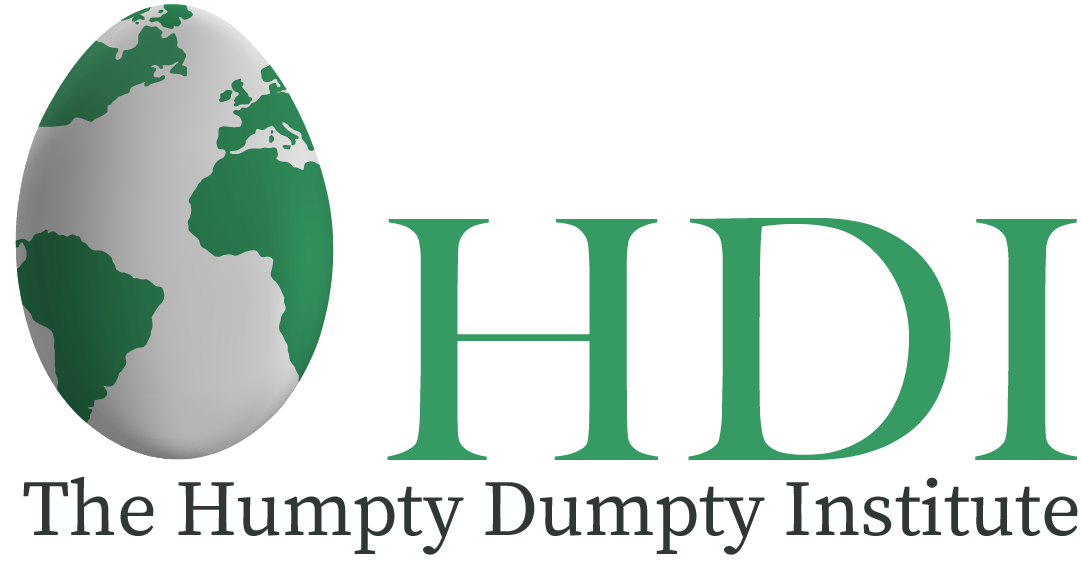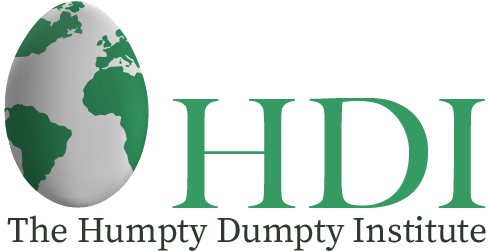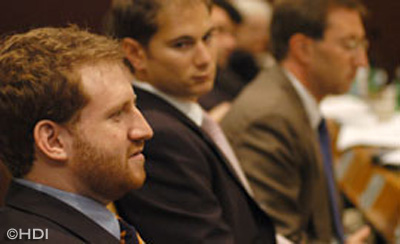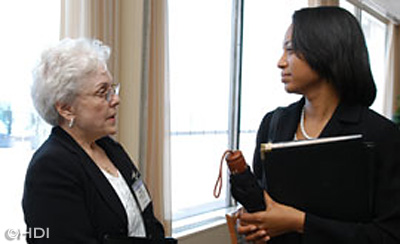Congressional Staff AidesThe Humpty Dumpty Institute sponsored its 20th Congressional Staff Delegation to the United Nations Headquarters on Thursday, August 3, and Friday, August 4, 2006.
The delegation, comprised of 26 Congressional aides, participated in a two-day program that focused on red-button issues such as the security situation in the Middle East, U.N. reform, human rights, peacekeeping, and anti-Israel bias at the U.N.. HDI organized an impressive collection of senior U.S. and U.N. officials to provide unfettered access to congressional participants.
Executive Summary
The Humpty Dumpty Institute sponsored its 20th Congressional Staff Delegation to the United Nations on Thursday, August 3, and Friday, August 4, 2006. HDI’s two-day program served as a “UN 101” for these aides; nearly all of the 26 aides noted that it was their first time to U.N. Headquarters, despite the fact that they work on U.N. issues within the context of their jobs. With this 20th delegation, HDI has now brought more than 330 congressional offices to United Nations Headquarters.
Working through the U.S. Mission and the U.N. Secretariat, Humpty Dumpty organized an impressive collection of senior U.S. and U.N. officials to provide unfettered access to congressional participants. Congressional staff had the opportunity to discuss such red-button issues as the security situation in the Middle East, U.N. reform, human rights, peacekeeping, and allegations of anti-Israel bias at the UN.
The Briefings
Shashi Tharoor, Under-Secretary-General for Communications and Public Information (currently on leave and participating in his personal capcity), thanked the congressional staff delegation for coming to the UN. Mr. Tharoor admitted that the U.N. has many shortcomings, but he also noted the many issues that only the U.N. can address given their universal nature: human rights, climate change, and refugee crises, humanitarian relief, conflict prevention, and peacekeeping. He asked the delegation to view the U.N. as an organization that deserves to be reformed because of its successes, rather than one that should be neglected because of its failings.
Warren Sach, Assistant Secretary-General and U.N. Controller, clearly outlined the U.N.’s budget in the framework of contributions, payments and spending. Mr. Sach discussed the three major budgets (UN regular budget, U.N. peacekeeping, and voluntary contributions to agencies such as UNICEF and UNDP), and discussed the treaty obligations of U.N. member-states in providing annual contributions to the UN. Mr. Sach also noted the U.N.’s success in adhering to a no-growth budget over the past several years, while at the same time implementing systemic reforms, shifting priorities, and increases in global peacekeeping. Several participants noted surprise that the U.N.’s budget committee (the Fifth Committee) operated essentially as a Committee of the Whole (with all 192 countries participating, rather than a limited number of offices as the U.S. Congress operates). Mr. Sach also described the Secretary-General’s reforms in the budget and finance area.
Chris Burnham, Under-Secretary-General for Management, focused his briefing on the U.N. management reforms. Mr. Burnham described how his department is working to make the U.N. a more effective steward of global funds. In cataloging the reforms agreed to by U.N. member-states and initiated by the U.N. Secretariat, Mr. Burnham listed the following progress: the creation of a functioning ethics office; implementation of a whistle-blower policy; most importantly, Mr. Burnham reported that the U.N. is implementing international public accounting standards – the same standards that are currently employed successfully by NATO and the European Community – in order to develop a culture of accountability and transparency at the organization.
Mr. Burnham ended his briefing by discussing two major challenges currently facing the UN: mandate review and the Capital Master Plan (the term used to describe the proposed renovation of the U.N. Headquarters building). He stated his desire for the U.N. to find a mechanism to reduce the number of frivolous mandates before the General Assembly so that the organization can streamline its work, give priority to the most significant issues, and operate more efficiently. He also highlighted the deteriorating and obsolete physical condition of the U.N. headquarters, which fails to meet basic fire and safety codes.
Ann Veneman, Executive Director of the U.N. Children’s Fund (UNICEF), described the mandate of UNICEF to protect children worldwide through the provision of food and safe drinking water, education, and health care. UNICEF is funded through voluntary contributions from both U.N. member-states and the private sector, and Ms. Veneman discussed at length the importance of maintaining donor confidence through effective use of resources. In detailing UNICEF’s activities, she also emphasized the importance of meeting the Millennium Development Goals (MDGs), a series of targets agreed to by more than 170 heads of state in 2000. She stressed that the MDGs reflect the priorities of UNICEF, and that achievement of these goals will substantially improve access to girls’ education, lowering child mortality rates, and universally improving primary school attendance, as they affect children and their communities world-wide.
Alejandro Wolff, Deputy U.S. Permanent Representative to the UN, briefed the delegation on U.S. priorities at the UN. Ambassador Wolff highlighted the distinction between U.N. member-states and the U.N. Secretariat, and noted the tendency to mistakenly blame impediments to U.N. reform on the Secretary-General, rather than on U.N. member-states, who must approve such reforms. He highlighted the many security issues that the U.S. is dealing with as a member of the Security Council, including the crisis in Lebanon and the nuclear programs of North Korea and Iran. Ambassador Wolff also emphasized the U.S. commitment to the U.N. reform process, noting that the U.S. has a great interest in the efficiency of U.N. operations because it contributes 22% of the organization’s assessed budget, more than any other member-state. Like Under-Secretary-General Chris Burnham, Ambassador Wolff singled out the mandate system as one of the greatest inefficiencies of the U.N. system, and said that streamlining the mandate review process would go a long way in strengthening U.N. effectiveness.
Craig Mokhiber, Officer-in-Charge at the New York Office of the High Commissioner for Human Rights, provided an overview of international human rights machinery, as well as the role of the U.N. High Commissioner for Human Rights in detailing allegations of human rights abuses around the world. Mr. Mokhiber also discussed the newly established Human Rights Council and discussed both how the Council is an improvement over its predecessor, the largely discredited Human Rights Commission, as well as noting that a number of challenges remained.
David Morrison, Director of Communications at the U.N. Development Program (UNDP), and Chetan Kumar, Program Manager for the Bureau of Conflict Prevention and Recovery, focused on both the short- and long-term approaches taken by UNDP to assist countries in recovery efforts, oftentimes in the form of the promoting democratic governance, fighting poverty, encouraging dialogue between ethnic groups, restoring livelihoods after natural disasters, and the resettlement of refugees and internally displaced persons. Both spoke of UNDP’s comparative advantage through its presence in 166 countries and as the leader of the U.N. Development Group, an inter-agency group made of U.N. departments, programs, and funds entrusted with ensuring that development activities are coordinated in a coherent and systemic manner. Mr. Kumar also described how UNDP is active in a number of global hot spots vital to American interests – particularly in Iraq, Afghanistan, and Haiti – through programs that promote democracy, prevent the outbreak of conflict, stabilize fragile states, and disarm and demobilize warring factions. Mr. Morrison also thanked the delegation for the fact that the U.S. contributes approximately 12% of UNDP’s annual budget.
Chris Coleman, Chief of Policy Planning and Mediation Support at the Department of Political Affairs (DPA), and David Biggs, a Political Affairs Officer in the Security Council Affairs Division of DPA, gave an overview of the work of their department, discussed how the Security Council functions, and talked about the issues the Council is currently addressing. Mr. Coleman noted that the DPA advises the Secretary-General and his envoys on political affairs as they relate to such issues as peacekeeping, conflict prevention, diplomacy, and electoral assistance. He also talked about recent reforms to DPA, including those that will make it possible for enhanced information sharing and the development of best practices that serve as a model for future missions. Mr. Biggs said that the current period is an extraordinarily busy one for the Security Council as it is currently working out resolutions that would level sanctions against Iran and North Korea, while addressing the situation in Lebanon.
Jean-Marie Guehenno, Under-Secretary-General for Peacekeeping, Lisa Buttenheim, Director of the Asia and Middle East Division at DPKO, and Salman Ahmed, Special Assistant to USG Guehenno, finished the program with a discussion on the evolution of U.N. peacekeeping over the years, with a specific emphasis on the challenges facing U.N. peacekeeping, including the current situation in Lebanon . Mr. Guehenno and Mr. Ahmed noted that a continuing challenge for the U.N. is in rebuilding war-torn countries into sustainable states. A key feature of the discussion included the Brahimi Report, which provided a number of useful and real world recommendations on how to improve both the nature and capacity of peacekeeping. Several congressional staff questioned Mr. Guehenno on the situation in the Middle East, on the comparative advantage and capacities of regional organizations, and the cost-effectiveness of U.N. peacekeeping.
Schedule
Thursday, August 3
7:00 am
Meet for Bus Transport to Dulles Airport near the Capitol South metro stop on First St. between C & D St. (across the street from the Capitol Hill Club)
8:40 am
Depart Washington DC Dulles National Airport on United Flight 846
9:54 am
Arrive New York LaGuardia Airport
10:00 am
Bus transport to Hotel
10:30 am
Drop off Luggage at the Murray Hill Suites Hotel
Location: 149 E 39th St. (b/w Lexington Ave. & 3rd Ave.)
11:15 am
Meet in Hotel Lobby for Transport to UN
12 – 1:30 pm
Working Luncheon: Welcome & Overview of the U.N. System
Shashi Tharoor, Under-Secretary-General for Communications and Public Information (Speaking in his personal capacity) (Confirmed)
Location: Delegates Dining Room
1:45 – 2:30 pm
Understanding the U.N. Budget
Warren Sach, Assistant Secretary-General, Controller (Confirmed)
Location: U.N. Conference Room 6
2:45 – 3:25 pm
Current Issues in U.N. Management Reform
Christopher Burnham, Under-Secretary-General for Management (Confirmed)
Location: U.N. Conference Room 6
3:30 – 4:15 pm
UNICEF’s Role in Protecting Children World-wide
Ann Veneman, Executive Director, UNICEF (Confirmed)
Location: U.N. Conference Room 6
6:00 pm
Welcome Reception featuring Americans Working at the UN
Location: Mica Bar (587 Third Ave., b/w 38th & 39th St.)
Friday, August 4
9 – 9:45 am
US Priorities at the United Nations
Ambassador John Bolton, Permanent Representative (Confirmed)
Location: U.N. Conference Room 6
10:00 – 10:45 am
Human Rights & the New U.N. Human Rights Council
Craig Mokhiber, Officer-in-Charge, New York Office of the U.N. High Commissioner for Human Rights (UNHCHR) (Confirmed)
Location: U.N. Conference Room 6
11 – 11:40 am
The U.N.’s Role in Conflict Prevention and Recovery
Kathleen Cravero, Assistant Administrator, UNDP (Confirmed)
Location: U.N. Conference Room 6
11:45 – 12:30 pm
Overview of the Department of Political Affairs & Major Issues Before the U.N. Security Council Chris Coleman, Chief, Policy Planning and Mediation Support, DPA
David Biggs, Security Council Affairs Division, DPA (Confirmed)
Location: U.N. Conference Room 6
12:45 – 2 pm
Working Luncheon: Challenges Facing U.N. Peacekeeping Operations
Salman Ahmed, Chief of Office/Special Assistant to the Under-Secretary-General for Peacekeeping Operations, DPKO (Confirmed)
Location: Delegates Dining Room
2:15 – 3:15 pm
UN Headquarters Site Inspection Tour
3:15 pm
Program Concludes
5:00 pm
Meet in Hotel Lobby for Bus Transport to Airport
7:07 pm
Depart New York LaGuardia Airport on United Flight 847
8:30 pm
Arrive Washington DC Dulles Airport
8:40 pm
Bus transport to Capitol Hill
Participants:
U.S. House of Representatives
Judah Ariel, Legislative Aide, Office of Rep. Earl Blumenauer (D-OR) **
Jennifer Bellamy, Legislative Counsel, Office of Rep. Spencer Bachus (R-AL)
Jeff Choudhry, Legislative Aide, Office of Rep. Trent Franks (R-AZ)
Brian Clifford, Legislative Director, Office of Rep. Jeff Flake (R-AZ) **
Judy Cohn, Legislative Fellow, Office of Rep. Charles B. Rangel (D-NY)
Chris Minakowski, Legislative Aide, Office of Rep. Dana Rohrabacher (R-CA) **
Kendra Fowler, Legislative Aide, Office of Rep. Devin Nunes (R-CA)
Ryan Hamilton, Legislative Aide, Office of Rep. Bob Inglis (R-SC)
Helen Hardin, Chief of Staff, Office of Rep. Zach Wamp (R-TN) *
Saul Hernandez, Legislative Aide, Office of Rep. G. K. Butterfield (D-NC)
Steve Holton, Legislative Aide, Office of Rep. Virginia Foxx (R-NC) ***
Laura Hooper, Legislative Aide, Office of Rep. Melvin L. Watt (D-NC)
Jacob Kurtzer, Legislative Aide, Office of Rep. Robert Wexler (D-FL) **
Ben Larocco, Legislative Aide, Office of Rep. Jean Schmidt (R-OH)
Munir Madyun, Legislative Aide, Office of Rep. Jose E. Serrano (D- NY) *
Deena Magnall, Legislative Aide, Office of Rep. Ed Pastor (D-AZ) *
Jodee Niswanger, Legislative Counsel, Office of Rep. Rodney Alexander (R-LA) *
Lindsey Plumley, Professional Staff, HIRC/AGI Subcommittee – Majority
Justin Rhee, Legislative Fellow, Office of Rep. Henry J. Hyde (R-IL) **
Joe Sheehy, Legislative Director, Office of Rep. Grace F. Napolitano (D-CA) **
Kelly Shields, Senior Legislative Aide, Office of Rep. Virgil H. Goode (R-VA) *
Jason Steinbaum, Chief of Staff, Office of Rep. Eliot Engel (D-NY) **
Eric Tamarkin, Legislative Aide, Office of Rep. John Conyers (D-MI)
Andrew Wimer, Legislative Aide, Office of Rep. Scott Garrett (R-NJ)
Mac Zimmerman, Chief of Staff, Office of Rep. Tom Tancredo (R-CO) **
* – Member, House Appropriations Committee
** – Member, House International Relations Committee
*** – Member, House Government Reform Committee
United Nations
Salman Ahmed, Chief of Office/Special Assistant to the Under-Secretary-General for Peacekeeping Operations, DPKO
David Biggs, Senior Political Officer, Security Council Affairs Division, DPA
Christopher Burnham, Under-Secretary-General for Management
Chris Coleman, Chief, Policy Planning and Mediation Support, DPA
Kathleen Cravero, Assistant Administrator, UNDP
Craig Mokhiber, Officer-in-Charge, New York Office of the U.N. High Commissioner for Human Rights (UNHCHR)
Warren Sach, Assistant Secretary-General, Controller
Shashi Tharoor, Under-Secretary-General for Communications and Public Information (Speaking in his personal capacity)
Ann Veneman, Executive Director, UNICEF
Peter Wenderborn, U.N. Capital Master Plan
United States Mission to the United States
Ambassador John Bolton, United States Permanent Representative to the UN
Travis Horel, Deputy Director, U.S. Mission to the U.N. – Washington Office
United States Mission to the United States
Ambassador John Bolton, United States Permanent Representative to the UN
Travis Horel, Deputy Director, U.S. Mission to the U.N. – Washington Office
Observers
Will Davis, Director, U.N. Information Center – Washington Office
Steve Dimoff, Senior Vice President, UNA-USA
Susan Myers, Executive Director, U.N. Foundation – NY Office
Nicole Sawran, Legislative Coordinator, Better World Campaign
Humpty Dumpty Institute
Ralph L. Cwerman, President
William Rigler, Executive Director
Caroline Gosselin, Program Manager
Paul Romita, Associate
Laura Luhman, Associate
Tahir Cevik, Associate
Scott Rudd, Photographer



















